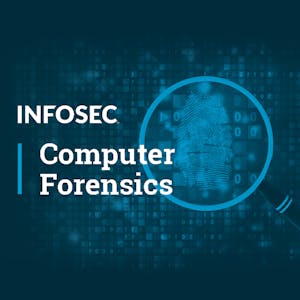This three-part InfoSec Specialization in Computer Forensics covers a wide variety of topics essential for understanding and applying digital forensics concepts. The Digital Forensics Concepts course delves into legal considerations, identification, collection, and preservation of digital evidence. It also explores scientific principles, on-scene triaging, keyword lists, grep, file hashing, and report writing.
The Windows Registry Forensics course focuses on examining the live registry, the location of registry files on the forensic image, and file extraction. Lastly, the Windows OS Forensics course covers windows file systems, such as Fat32, ExFat, and NTFS, and teaches students how to recover deleted files. The course provides a comprehensive understanding of how these systems store data and how to validate information from multiple forensic tools properly.
Certificate Available ✔
Get Started / More Info
This Computer Forensics Specialization comprises three courses: Digital Forensics Concepts, Windows OS Forensics, and Windows Registry Forensics, covering legal considerations, scientific principles, file systems, and registry analysis.
The Digital Forensics Concepts course provides an in-depth understanding of legal considerations, scientific principles, and practical skills for on-scene triaging, keyword lists, grep, file hashing, and report writing.
The Windows OS Forensics course delves into the intricacies of windows file systems such as Fat32, ExFat, and NTFS. It covers how these systems store data, the process of writing and deleting files, and methods for recovering deleted files.
The Windows Registry Forensics course focuses on examining the live registry, identifying the location of registry files on the forensic image, and extracting files for analysis.
Become a Splunk Search Expert and master the art of writing efficient searches, performing correlations, creating visualizations, and leveraging subsearches and...
Information Systems Auditing, Controls and Assurance provides a comprehensive understanding of IS auditing, risk management, and the role of IS auditors in system...
Python for Command-and-control, Exfiltration and Impact is a comprehensive course that delves into the use of Python for executing command-and-control operations,...
Explore the fundamentals of network security with the Network Security Support Fundamentals course. Gain essential knowledge to understand enterprise network security...